Commercial and Corporation Law: Case Study and Legal Framework
VerifiedAdded on 2021/04/21
|19
|5181
|279
Case Study
AI Summary
This case study delves into key aspects of commercial and corporation law, examining two distinct scenarios. The first scenario explores the applicability of the "Act of God" defense in a contract dispute, analyzing contractual terms, promissory estoppel, and the legal implications of unforeseen events like a volcano eruption. The second scenario focuses on contract amendments, assessing whether a party is obligated to fulfill the original contractual terms or if they can modify them due to unforeseen circumstances like staff shortages. The analysis covers legal obligations, consent requirements, and the general principles of contract law, providing a comprehensive understanding of the legal frameworks involved. The assignment also discusses the concept of contract validity and the legal implications of breaching contractual terms, using relevant case laws to support the arguments.
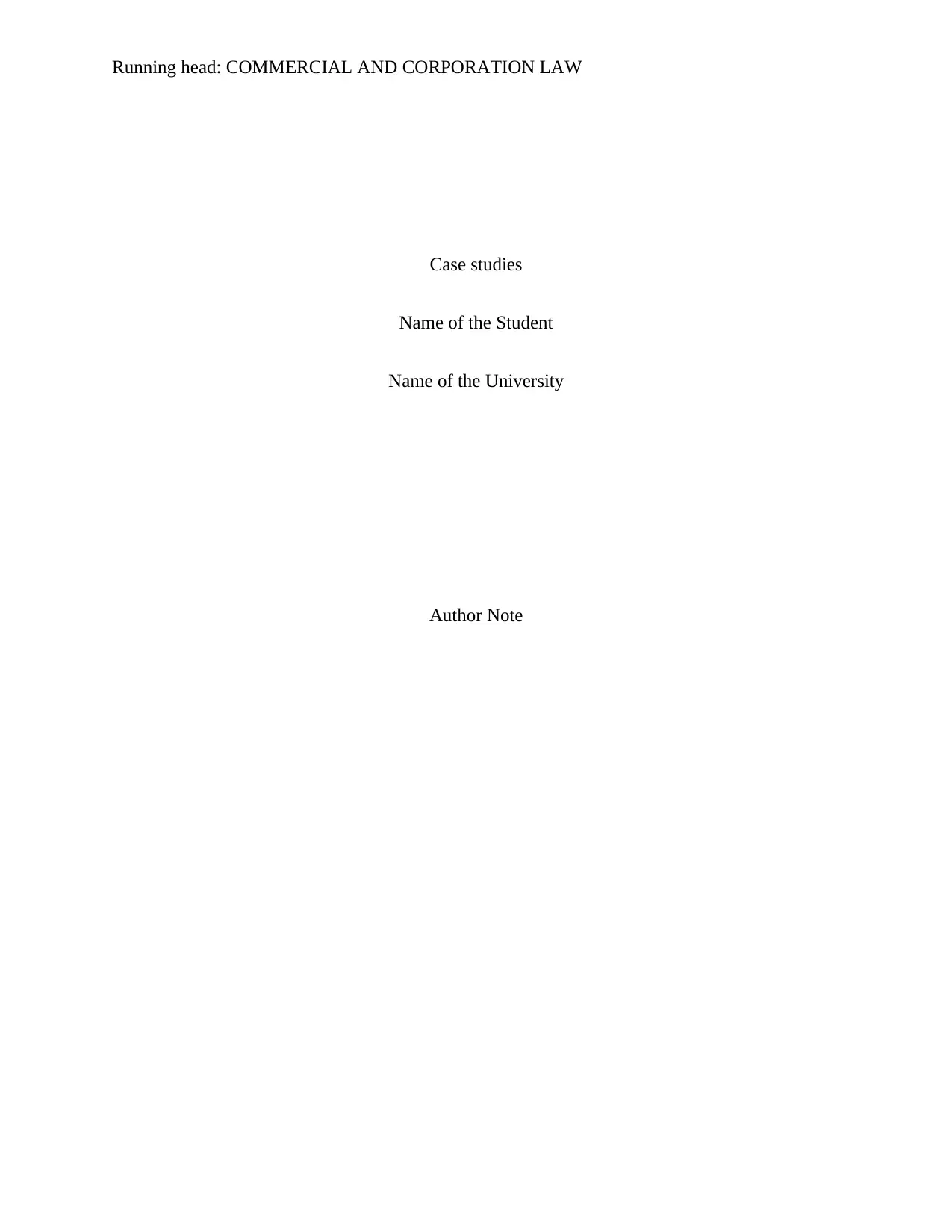
Running head: COMMERCIAL AND CORPORATION LAW
Case studies
Name of the Student
Name of the University
Author Note
Case studies
Name of the Student
Name of the University
Author Note
Paraphrase This Document
Need a fresh take? Get an instant paraphrase of this document with our AI Paraphraser
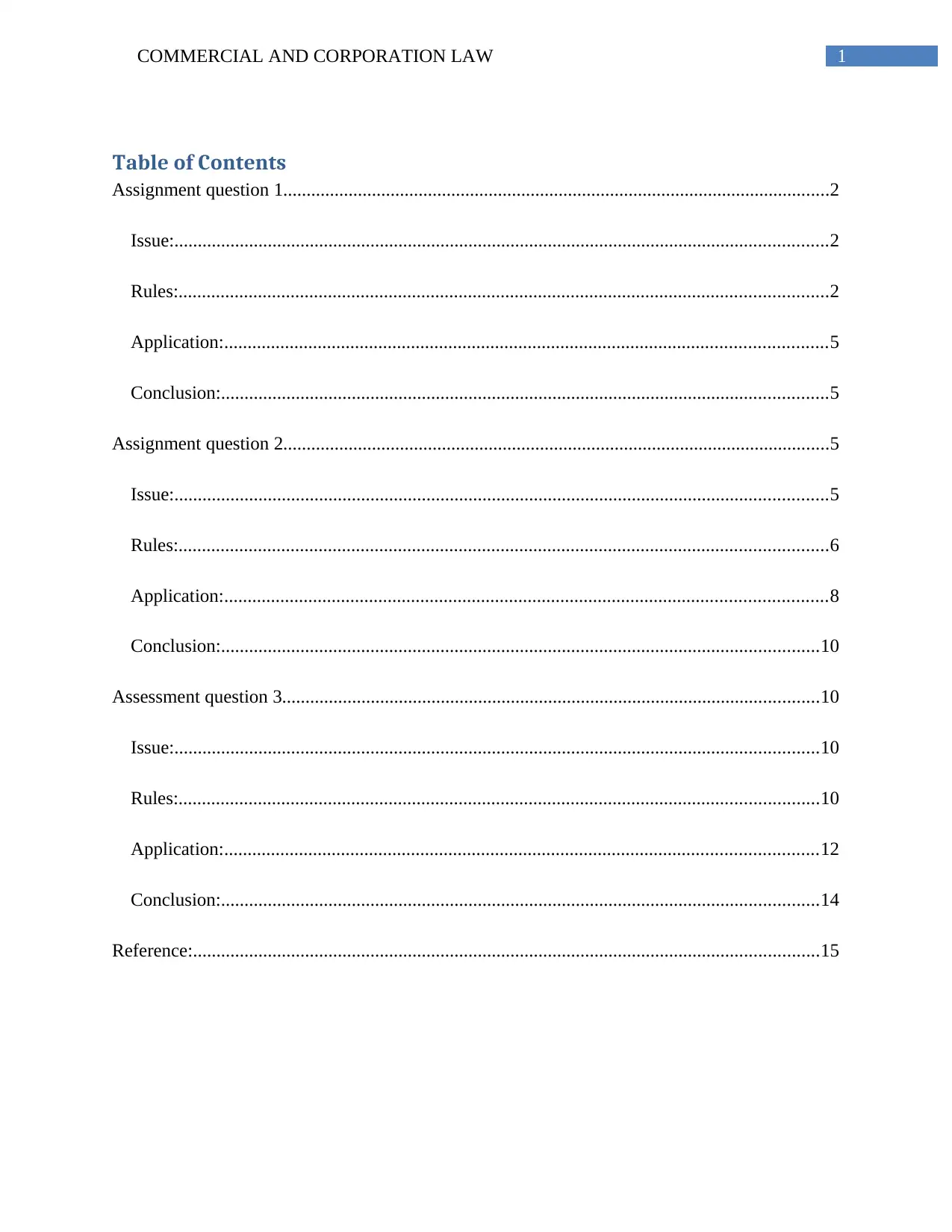
1COMMERCIAL AND CORPORATION LAW
Table of Contents
Assignment question 1.....................................................................................................................2
Issue:............................................................................................................................................2
Rules:...........................................................................................................................................2
Application:.................................................................................................................................5
Conclusion:..................................................................................................................................5
Assignment question 2.....................................................................................................................5
Issue:............................................................................................................................................5
Rules:...........................................................................................................................................6
Application:.................................................................................................................................8
Conclusion:................................................................................................................................10
Assessment question 3...................................................................................................................10
Issue:..........................................................................................................................................10
Rules:.........................................................................................................................................10
Application:...............................................................................................................................12
Conclusion:................................................................................................................................14
Reference:......................................................................................................................................15
Table of Contents
Assignment question 1.....................................................................................................................2
Issue:............................................................................................................................................2
Rules:...........................................................................................................................................2
Application:.................................................................................................................................5
Conclusion:..................................................................................................................................5
Assignment question 2.....................................................................................................................5
Issue:............................................................................................................................................5
Rules:...........................................................................................................................................6
Application:.................................................................................................................................8
Conclusion:................................................................................................................................10
Assessment question 3...................................................................................................................10
Issue:..........................................................................................................................................10
Rules:.........................................................................................................................................10
Application:...............................................................................................................................12
Conclusion:................................................................................................................................14
Reference:......................................................................................................................................15

2COMMERCIAL AND CORPORATION LAW
⊘ This is a preview!⊘
Do you want full access?
Subscribe today to unlock all pages.

Trusted by 1+ million students worldwide
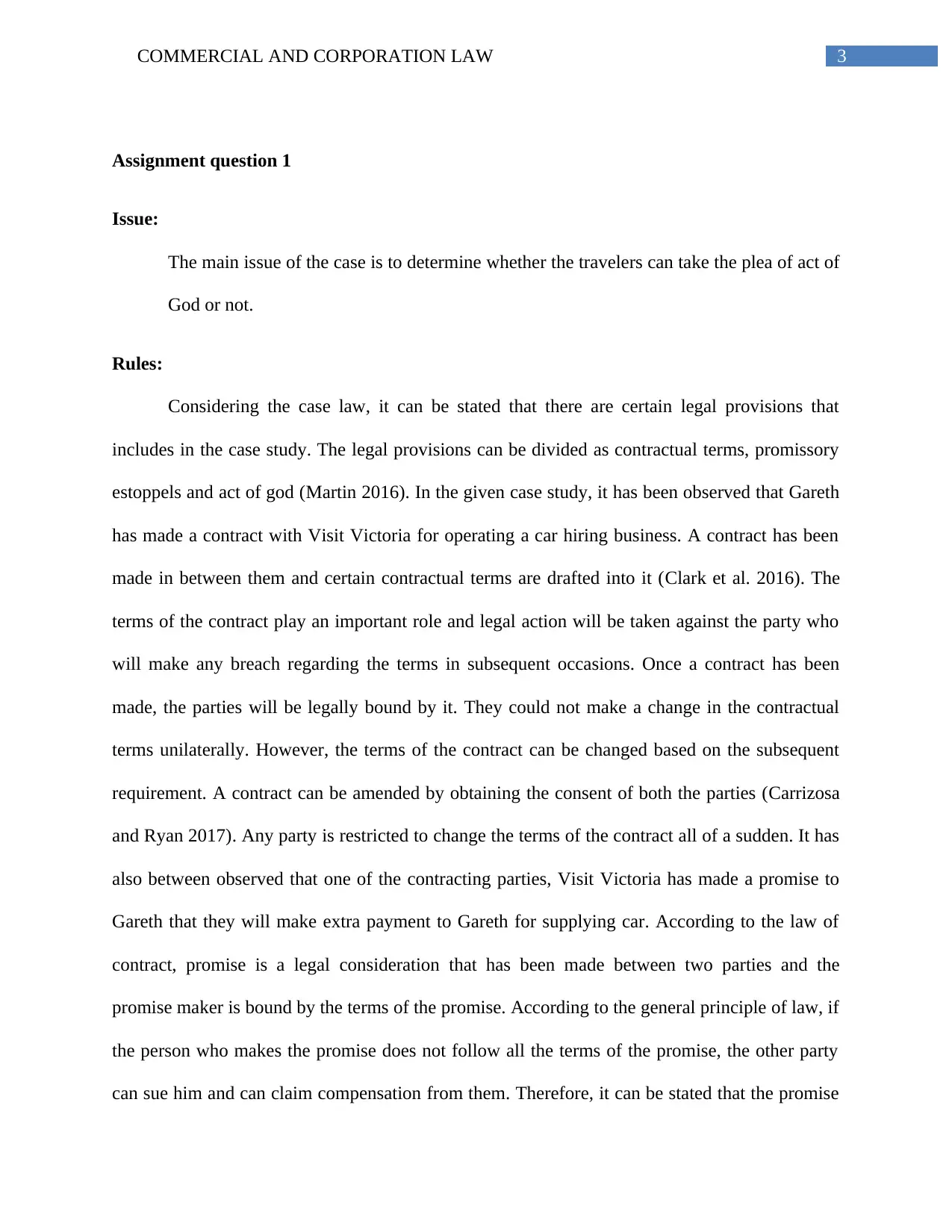
3COMMERCIAL AND CORPORATION LAW
Assignment question 1
Issue:
The main issue of the case is to determine whether the travelers can take the plea of act of
God or not.
Rules:
Considering the case law, it can be stated that there are certain legal provisions that
includes in the case study. The legal provisions can be divided as contractual terms, promissory
estoppels and act of god (Martin 2016). In the given case study, it has been observed that Gareth
has made a contract with Visit Victoria for operating a car hiring business. A contract has been
made in between them and certain contractual terms are drafted into it (Clark et al. 2016). The
terms of the contract play an important role and legal action will be taken against the party who
will make any breach regarding the terms in subsequent occasions. Once a contract has been
made, the parties will be legally bound by it. They could not make a change in the contractual
terms unilaterally. However, the terms of the contract can be changed based on the subsequent
requirement. A contract can be amended by obtaining the consent of both the parties (Carrizosa
and Ryan 2017). Any party is restricted to change the terms of the contract all of a sudden. It has
also between observed that one of the contracting parties, Visit Victoria has made a promise to
Gareth that they will make extra payment to Gareth for supplying car. According to the law of
contract, promise is a legal consideration that has been made between two parties and the
promise maker is bound by the terms of the promise. According to the general principle of law, if
the person who makes the promise does not follow all the terms of the promise, the other party
can sue him and can claim compensation from them. Therefore, it can be stated that the promise
Assignment question 1
Issue:
The main issue of the case is to determine whether the travelers can take the plea of act of
God or not.
Rules:
Considering the case law, it can be stated that there are certain legal provisions that
includes in the case study. The legal provisions can be divided as contractual terms, promissory
estoppels and act of god (Martin 2016). In the given case study, it has been observed that Gareth
has made a contract with Visit Victoria for operating a car hiring business. A contract has been
made in between them and certain contractual terms are drafted into it (Clark et al. 2016). The
terms of the contract play an important role and legal action will be taken against the party who
will make any breach regarding the terms in subsequent occasions. Once a contract has been
made, the parties will be legally bound by it. They could not make a change in the contractual
terms unilaterally. However, the terms of the contract can be changed based on the subsequent
requirement. A contract can be amended by obtaining the consent of both the parties (Carrizosa
and Ryan 2017). Any party is restricted to change the terms of the contract all of a sudden. It has
also between observed that one of the contracting parties, Visit Victoria has made a promise to
Gareth that they will make extra payment to Gareth for supplying car. According to the law of
contract, promise is a legal consideration that has been made between two parties and the
promise maker is bound by the terms of the promise. According to the general principle of law, if
the person who makes the promise does not follow all the terms of the promise, the other party
can sue him and can claim compensation from them. Therefore, it can be stated that the promise
Paraphrase This Document
Need a fresh take? Get an instant paraphrase of this document with our AI Paraphraser
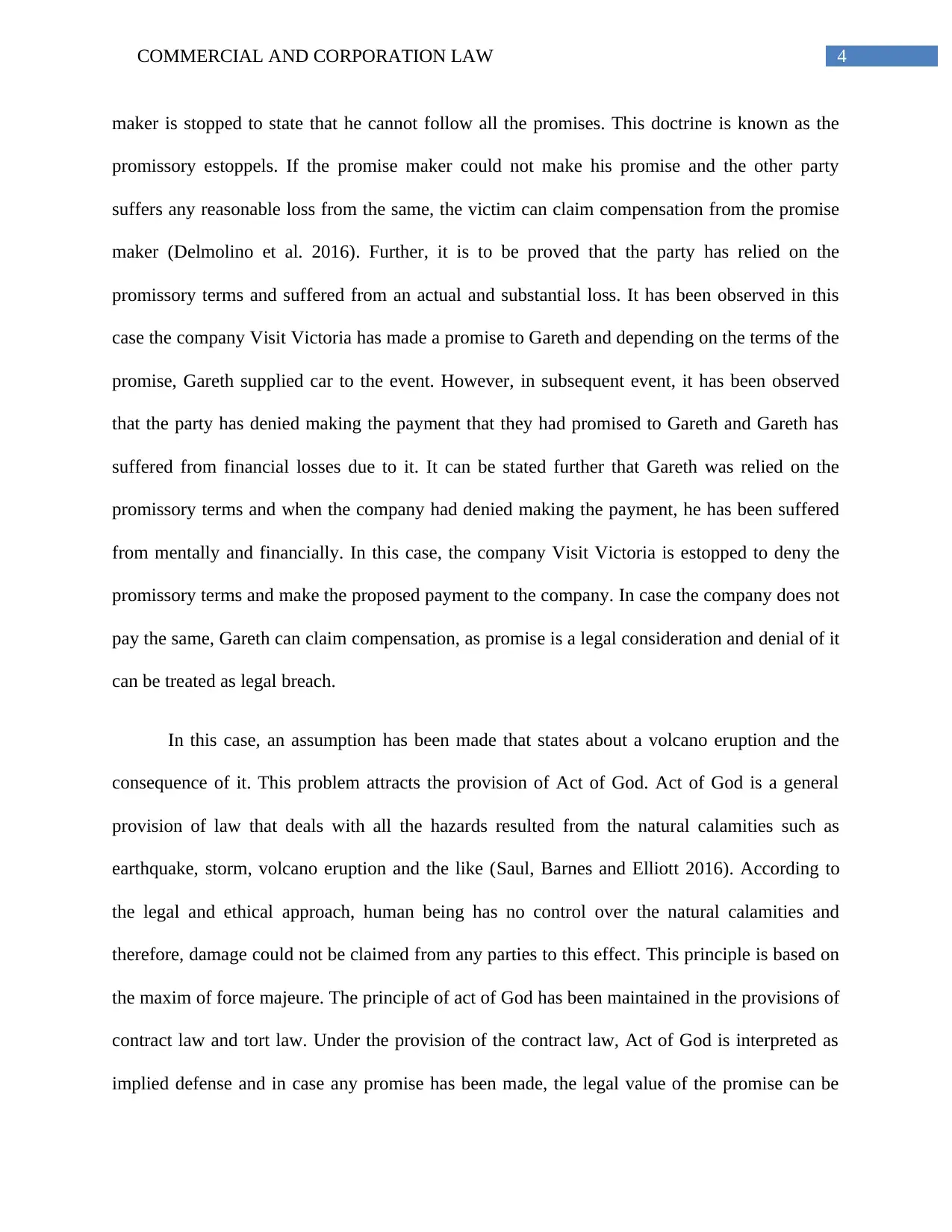
4COMMERCIAL AND CORPORATION LAW
maker is stopped to state that he cannot follow all the promises. This doctrine is known as the
promissory estoppels. If the promise maker could not make his promise and the other party
suffers any reasonable loss from the same, the victim can claim compensation from the promise
maker (Delmolino et al. 2016). Further, it is to be proved that the party has relied on the
promissory terms and suffered from an actual and substantial loss. It has been observed in this
case the company Visit Victoria has made a promise to Gareth and depending on the terms of the
promise, Gareth supplied car to the event. However, in subsequent event, it has been observed
that the party has denied making the payment that they had promised to Gareth and Gareth has
suffered from financial losses due to it. It can be stated further that Gareth was relied on the
promissory terms and when the company had denied making the payment, he has been suffered
from mentally and financially. In this case, the company Visit Victoria is estopped to deny the
promissory terms and make the proposed payment to the company. In case the company does not
pay the same, Gareth can claim compensation, as promise is a legal consideration and denial of it
can be treated as legal breach.
In this case, an assumption has been made that states about a volcano eruption and the
consequence of it. This problem attracts the provision of Act of God. Act of God is a general
provision of law that deals with all the hazards resulted from the natural calamities such as
earthquake, storm, volcano eruption and the like (Saul, Barnes and Elliott 2016). According to
the legal and ethical approach, human being has no control over the natural calamities and
therefore, damage could not be claimed from any parties to this effect. This principle is based on
the maxim of force majeure. The principle of act of God has been maintained in the provisions of
contract law and tort law. Under the provision of the contract law, Act of God is interpreted as
implied defense and in case any promise has been made, the legal value of the promise can be
maker is stopped to state that he cannot follow all the promises. This doctrine is known as the
promissory estoppels. If the promise maker could not make his promise and the other party
suffers any reasonable loss from the same, the victim can claim compensation from the promise
maker (Delmolino et al. 2016). Further, it is to be proved that the party has relied on the
promissory terms and suffered from an actual and substantial loss. It has been observed in this
case the company Visit Victoria has made a promise to Gareth and depending on the terms of the
promise, Gareth supplied car to the event. However, in subsequent event, it has been observed
that the party has denied making the payment that they had promised to Gareth and Gareth has
suffered from financial losses due to it. It can be stated further that Gareth was relied on the
promissory terms and when the company had denied making the payment, he has been suffered
from mentally and financially. In this case, the company Visit Victoria is estopped to deny the
promissory terms and make the proposed payment to the company. In case the company does not
pay the same, Gareth can claim compensation, as promise is a legal consideration and denial of it
can be treated as legal breach.
In this case, an assumption has been made that states about a volcano eruption and the
consequence of it. This problem attracts the provision of Act of God. Act of God is a general
provision of law that deals with all the hazards resulted from the natural calamities such as
earthquake, storm, volcano eruption and the like (Saul, Barnes and Elliott 2016). According to
the legal and ethical approach, human being has no control over the natural calamities and
therefore, damage could not be claimed from any parties to this effect. This principle is based on
the maxim of force majeure. The principle of act of God has been maintained in the provisions of
contract law and tort law. Under the provision of the contract law, Act of God is interpreted as
implied defense and in case any promise has been made, the legal value of the promise can be
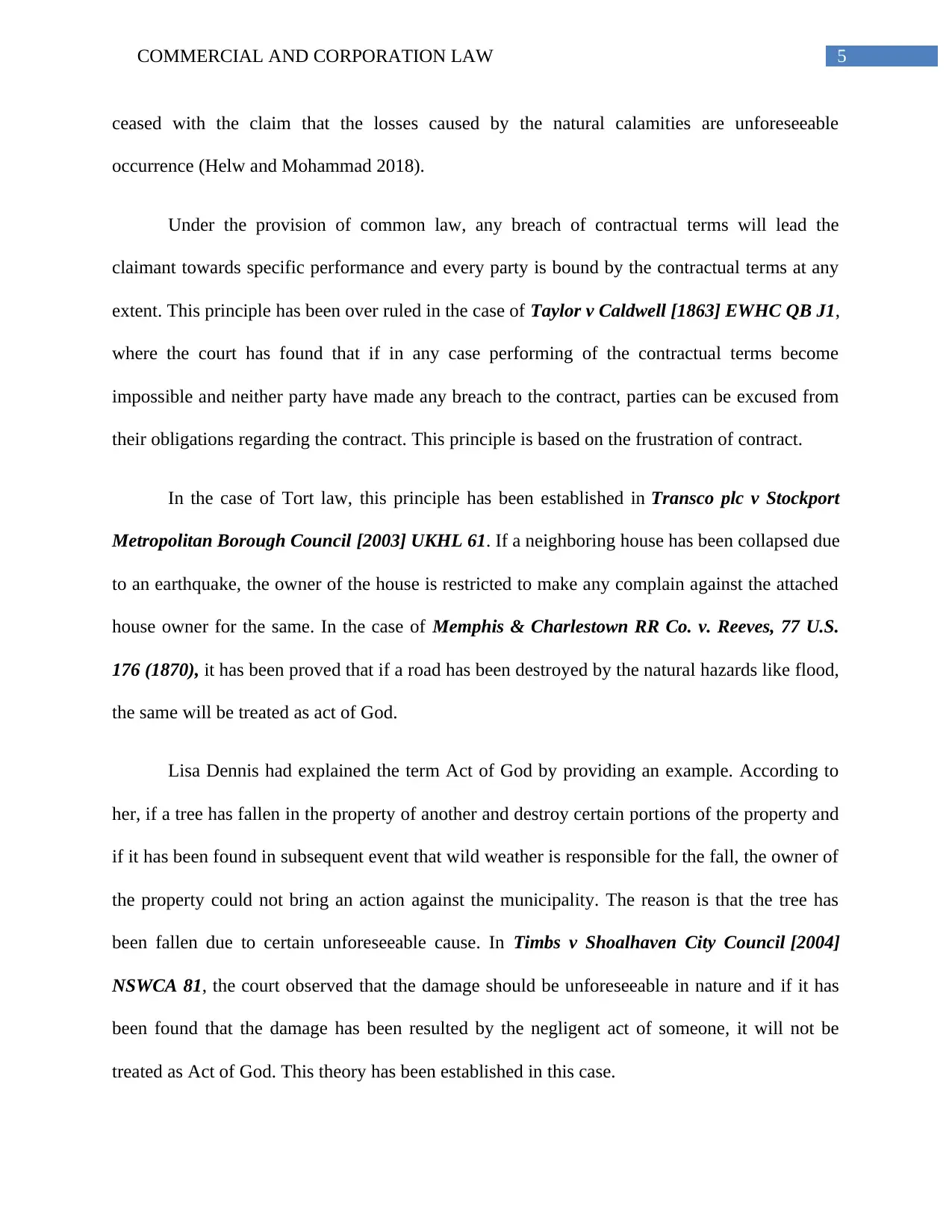
5COMMERCIAL AND CORPORATION LAW
ceased with the claim that the losses caused by the natural calamities are unforeseeable
occurrence (Helw and Mohammad 2018).
Under the provision of common law, any breach of contractual terms will lead the
claimant towards specific performance and every party is bound by the contractual terms at any
extent. This principle has been over ruled in the case of Taylor v Caldwell [1863] EWHC QB J1,
where the court has found that if in any case performing of the contractual terms become
impossible and neither party have made any breach to the contract, parties can be excused from
their obligations regarding the contract. This principle is based on the frustration of contract.
In the case of Tort law, this principle has been established in Transco plc v Stockport
Metropolitan Borough Council [2003] UKHL 61. If a neighboring house has been collapsed due
to an earthquake, the owner of the house is restricted to make any complain against the attached
house owner for the same. In the case of Memphis & Charlestown RR Co. v. Reeves, 77 U.S.
176 (1870), it has been proved that if a road has been destroyed by the natural hazards like flood,
the same will be treated as act of God.
Lisa Dennis had explained the term Act of God by providing an example. According to
her, if a tree has fallen in the property of another and destroy certain portions of the property and
if it has been found in subsequent event that wild weather is responsible for the fall, the owner of
the property could not bring an action against the municipality. The reason is that the tree has
been fallen due to certain unforeseeable cause. In Timbs v Shoalhaven City Council [2004]
NSWCA 81, the court observed that the damage should be unforeseeable in nature and if it has
been found that the damage has been resulted by the negligent act of someone, it will not be
treated as Act of God. This theory has been established in this case.
ceased with the claim that the losses caused by the natural calamities are unforeseeable
occurrence (Helw and Mohammad 2018).
Under the provision of common law, any breach of contractual terms will lead the
claimant towards specific performance and every party is bound by the contractual terms at any
extent. This principle has been over ruled in the case of Taylor v Caldwell [1863] EWHC QB J1,
where the court has found that if in any case performing of the contractual terms become
impossible and neither party have made any breach to the contract, parties can be excused from
their obligations regarding the contract. This principle is based on the frustration of contract.
In the case of Tort law, this principle has been established in Transco plc v Stockport
Metropolitan Borough Council [2003] UKHL 61. If a neighboring house has been collapsed due
to an earthquake, the owner of the house is restricted to make any complain against the attached
house owner for the same. In the case of Memphis & Charlestown RR Co. v. Reeves, 77 U.S.
176 (1870), it has been proved that if a road has been destroyed by the natural hazards like flood,
the same will be treated as act of God.
Lisa Dennis had explained the term Act of God by providing an example. According to
her, if a tree has fallen in the property of another and destroy certain portions of the property and
if it has been found in subsequent event that wild weather is responsible for the fall, the owner of
the property could not bring an action against the municipality. The reason is that the tree has
been fallen due to certain unforeseeable cause. In Timbs v Shoalhaven City Council [2004]
NSWCA 81, the court observed that the damage should be unforeseeable in nature and if it has
been found that the damage has been resulted by the negligent act of someone, it will not be
treated as Act of God. This theory has been established in this case.
⊘ This is a preview!⊘
Do you want full access?
Subscribe today to unlock all pages.

Trusted by 1+ million students worldwide
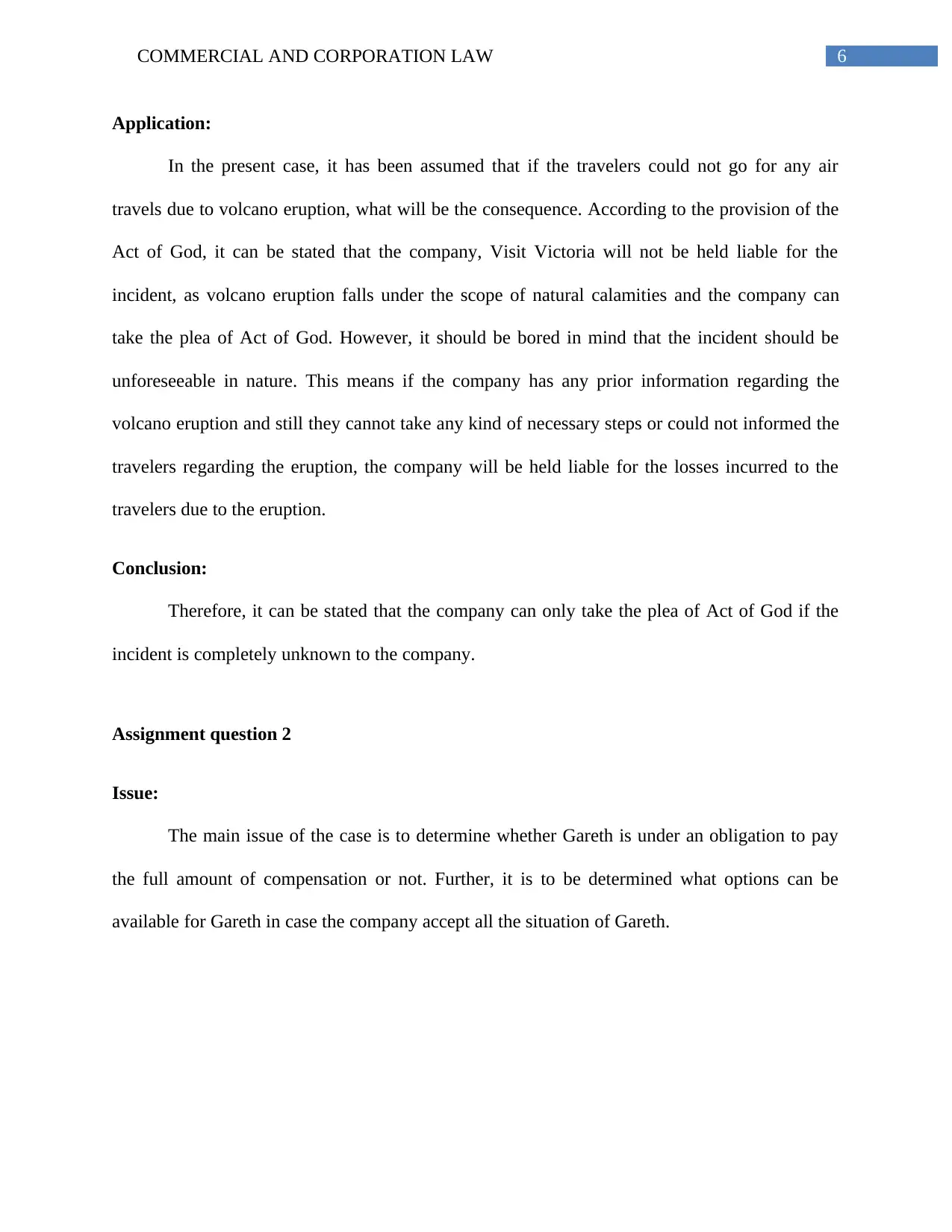
6COMMERCIAL AND CORPORATION LAW
Application:
In the present case, it has been assumed that if the travelers could not go for any air
travels due to volcano eruption, what will be the consequence. According to the provision of the
Act of God, it can be stated that the company, Visit Victoria will not be held liable for the
incident, as volcano eruption falls under the scope of natural calamities and the company can
take the plea of Act of God. However, it should be bored in mind that the incident should be
unforeseeable in nature. This means if the company has any prior information regarding the
volcano eruption and still they cannot take any kind of necessary steps or could not informed the
travelers regarding the eruption, the company will be held liable for the losses incurred to the
travelers due to the eruption.
Conclusion:
Therefore, it can be stated that the company can only take the plea of Act of God if the
incident is completely unknown to the company.
Assignment question 2
Issue:
The main issue of the case is to determine whether Gareth is under an obligation to pay
the full amount of compensation or not. Further, it is to be determined what options can be
available for Gareth in case the company accept all the situation of Gareth.
Application:
In the present case, it has been assumed that if the travelers could not go for any air
travels due to volcano eruption, what will be the consequence. According to the provision of the
Act of God, it can be stated that the company, Visit Victoria will not be held liable for the
incident, as volcano eruption falls under the scope of natural calamities and the company can
take the plea of Act of God. However, it should be bored in mind that the incident should be
unforeseeable in nature. This means if the company has any prior information regarding the
volcano eruption and still they cannot take any kind of necessary steps or could not informed the
travelers regarding the eruption, the company will be held liable for the losses incurred to the
travelers due to the eruption.
Conclusion:
Therefore, it can be stated that the company can only take the plea of Act of God if the
incident is completely unknown to the company.
Assignment question 2
Issue:
The main issue of the case is to determine whether Gareth is under an obligation to pay
the full amount of compensation or not. Further, it is to be determined what options can be
available for Gareth in case the company accept all the situation of Gareth.
Paraphrase This Document
Need a fresh take? Get an instant paraphrase of this document with our AI Paraphraser
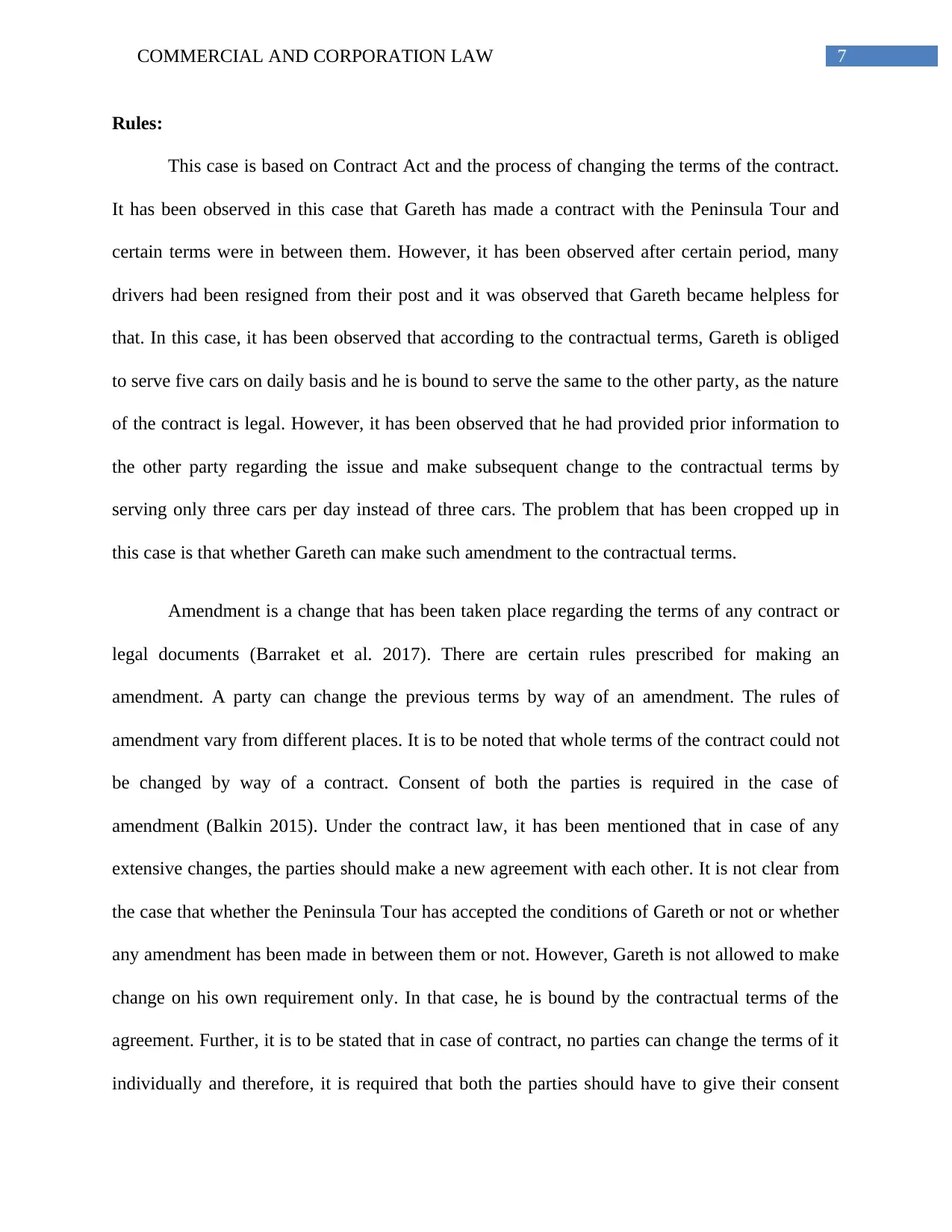
7COMMERCIAL AND CORPORATION LAW
Rules:
This case is based on Contract Act and the process of changing the terms of the contract.
It has been observed in this case that Gareth has made a contract with the Peninsula Tour and
certain terms were in between them. However, it has been observed after certain period, many
drivers had been resigned from their post and it was observed that Gareth became helpless for
that. In this case, it has been observed that according to the contractual terms, Gareth is obliged
to serve five cars on daily basis and he is bound to serve the same to the other party, as the nature
of the contract is legal. However, it has been observed that he had provided prior information to
the other party regarding the issue and make subsequent change to the contractual terms by
serving only three cars per day instead of three cars. The problem that has been cropped up in
this case is that whether Gareth can make such amendment to the contractual terms.
Amendment is a change that has been taken place regarding the terms of any contract or
legal documents (Barraket et al. 2017). There are certain rules prescribed for making an
amendment. A party can change the previous terms by way of an amendment. The rules of
amendment vary from different places. It is to be noted that whole terms of the contract could not
be changed by way of a contract. Consent of both the parties is required in the case of
amendment (Balkin 2015). Under the contract law, it has been mentioned that in case of any
extensive changes, the parties should make a new agreement with each other. It is not clear from
the case that whether the Peninsula Tour has accepted the conditions of Gareth or not or whether
any amendment has been made in between them or not. However, Gareth is not allowed to make
change on his own requirement only. In that case, he is bound by the contractual terms of the
agreement. Further, it is to be stated that in case of contract, no parties can change the terms of it
individually and therefore, it is required that both the parties should have to give their consent
Rules:
This case is based on Contract Act and the process of changing the terms of the contract.
It has been observed in this case that Gareth has made a contract with the Peninsula Tour and
certain terms were in between them. However, it has been observed after certain period, many
drivers had been resigned from their post and it was observed that Gareth became helpless for
that. In this case, it has been observed that according to the contractual terms, Gareth is obliged
to serve five cars on daily basis and he is bound to serve the same to the other party, as the nature
of the contract is legal. However, it has been observed that he had provided prior information to
the other party regarding the issue and make subsequent change to the contractual terms by
serving only three cars per day instead of three cars. The problem that has been cropped up in
this case is that whether Gareth can make such amendment to the contractual terms.
Amendment is a change that has been taken place regarding the terms of any contract or
legal documents (Barraket et al. 2017). There are certain rules prescribed for making an
amendment. A party can change the previous terms by way of an amendment. The rules of
amendment vary from different places. It is to be noted that whole terms of the contract could not
be changed by way of a contract. Consent of both the parties is required in the case of
amendment (Balkin 2015). Under the contract law, it has been mentioned that in case of any
extensive changes, the parties should make a new agreement with each other. It is not clear from
the case that whether the Peninsula Tour has accepted the conditions of Gareth or not or whether
any amendment has been made in between them or not. However, Gareth is not allowed to make
change on his own requirement only. In that case, he is bound by the contractual terms of the
agreement. Further, it is to be stated that in case of contract, no parties can change the terms of it
individually and therefore, it is required that both the parties should have to give their consent
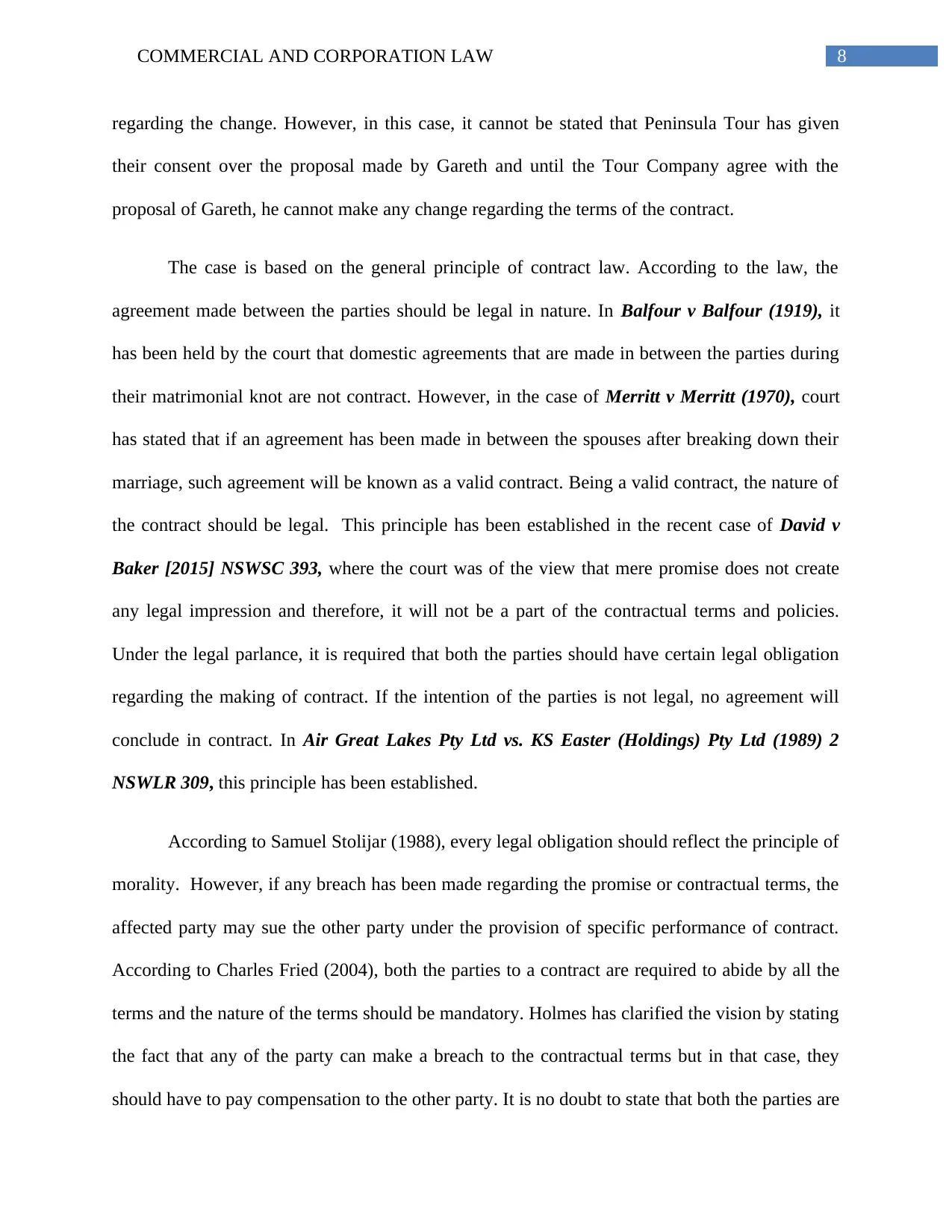
8COMMERCIAL AND CORPORATION LAW
regarding the change. However, in this case, it cannot be stated that Peninsula Tour has given
their consent over the proposal made by Gareth and until the Tour Company agree with the
proposal of Gareth, he cannot make any change regarding the terms of the contract.
The case is based on the general principle of contract law. According to the law, the
agreement made between the parties should be legal in nature. In Balfour v Balfour (1919), it
has been held by the court that domestic agreements that are made in between the parties during
their matrimonial knot are not contract. However, in the case of Merritt v Merritt (1970), court
has stated that if an agreement has been made in between the spouses after breaking down their
marriage, such agreement will be known as a valid contract. Being a valid contract, the nature of
the contract should be legal. This principle has been established in the recent case of David v
Baker [2015] NSWSC 393, where the court was of the view that mere promise does not create
any legal impression and therefore, it will not be a part of the contractual terms and policies.
Under the legal parlance, it is required that both the parties should have certain legal obligation
regarding the making of contract. If the intention of the parties is not legal, no agreement will
conclude in contract. In Air Great Lakes Pty Ltd vs. KS Easter (Holdings) Pty Ltd (1989) 2
NSWLR 309, this principle has been established.
According to Samuel Stolijar (1988), every legal obligation should reflect the principle of
morality. However, if any breach has been made regarding the promise or contractual terms, the
affected party may sue the other party under the provision of specific performance of contract.
According to Charles Fried (2004), both the parties to a contract are required to abide by all the
terms and the nature of the terms should be mandatory. Holmes has clarified the vision by stating
the fact that any of the party can make a breach to the contractual terms but in that case, they
should have to pay compensation to the other party. It is no doubt to state that both the parties are
regarding the change. However, in this case, it cannot be stated that Peninsula Tour has given
their consent over the proposal made by Gareth and until the Tour Company agree with the
proposal of Gareth, he cannot make any change regarding the terms of the contract.
The case is based on the general principle of contract law. According to the law, the
agreement made between the parties should be legal in nature. In Balfour v Balfour (1919), it
has been held by the court that domestic agreements that are made in between the parties during
their matrimonial knot are not contract. However, in the case of Merritt v Merritt (1970), court
has stated that if an agreement has been made in between the spouses after breaking down their
marriage, such agreement will be known as a valid contract. Being a valid contract, the nature of
the contract should be legal. This principle has been established in the recent case of David v
Baker [2015] NSWSC 393, where the court was of the view that mere promise does not create
any legal impression and therefore, it will not be a part of the contractual terms and policies.
Under the legal parlance, it is required that both the parties should have certain legal obligation
regarding the making of contract. If the intention of the parties is not legal, no agreement will
conclude in contract. In Air Great Lakes Pty Ltd vs. KS Easter (Holdings) Pty Ltd (1989) 2
NSWLR 309, this principle has been established.
According to Samuel Stolijar (1988), every legal obligation should reflect the principle of
morality. However, if any breach has been made regarding the promise or contractual terms, the
affected party may sue the other party under the provision of specific performance of contract.
According to Charles Fried (2004), both the parties to a contract are required to abide by all the
terms and the nature of the terms should be mandatory. Holmes has clarified the vision by stating
the fact that any of the party can make a breach to the contractual terms but in that case, they
should have to pay compensation to the other party. It is no doubt to state that both the parties are
⊘ This is a preview!⊘
Do you want full access?
Subscribe today to unlock all pages.

Trusted by 1+ million students worldwide
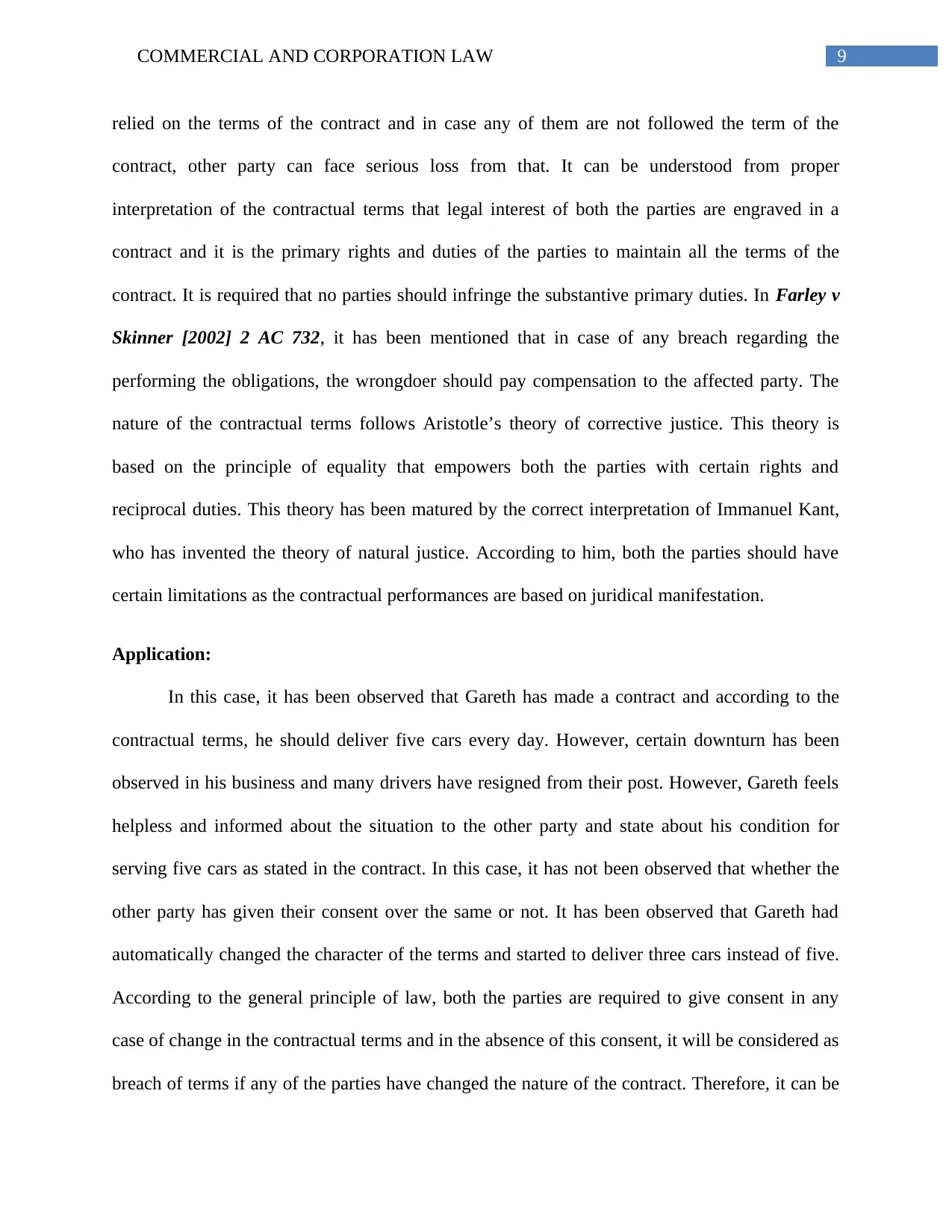
9COMMERCIAL AND CORPORATION LAW
relied on the terms of the contract and in case any of them are not followed the term of the
contract, other party can face serious loss from that. It can be understood from proper
interpretation of the contractual terms that legal interest of both the parties are engraved in a
contract and it is the primary rights and duties of the parties to maintain all the terms of the
contract. It is required that no parties should infringe the substantive primary duties. In Farley v
Skinner [2002] 2 AC 732, it has been mentioned that in case of any breach regarding the
performing the obligations, the wrongdoer should pay compensation to the affected party. The
nature of the contractual terms follows Aristotle’s theory of corrective justice. This theory is
based on the principle of equality that empowers both the parties with certain rights and
reciprocal duties. This theory has been matured by the correct interpretation of Immanuel Kant,
who has invented the theory of natural justice. According to him, both the parties should have
certain limitations as the contractual performances are based on juridical manifestation.
Application:
In this case, it has been observed that Gareth has made a contract and according to the
contractual terms, he should deliver five cars every day. However, certain downturn has been
observed in his business and many drivers have resigned from their post. However, Gareth feels
helpless and informed about the situation to the other party and state about his condition for
serving five cars as stated in the contract. In this case, it has not been observed that whether the
other party has given their consent over the same or not. It has been observed that Gareth had
automatically changed the character of the terms and started to deliver three cars instead of five.
According to the general principle of law, both the parties are required to give consent in any
case of change in the contractual terms and in the absence of this consent, it will be considered as
breach of terms if any of the parties have changed the nature of the contract. Therefore, it can be
relied on the terms of the contract and in case any of them are not followed the term of the
contract, other party can face serious loss from that. It can be understood from proper
interpretation of the contractual terms that legal interest of both the parties are engraved in a
contract and it is the primary rights and duties of the parties to maintain all the terms of the
contract. It is required that no parties should infringe the substantive primary duties. In Farley v
Skinner [2002] 2 AC 732, it has been mentioned that in case of any breach regarding the
performing the obligations, the wrongdoer should pay compensation to the affected party. The
nature of the contractual terms follows Aristotle’s theory of corrective justice. This theory is
based on the principle of equality that empowers both the parties with certain rights and
reciprocal duties. This theory has been matured by the correct interpretation of Immanuel Kant,
who has invented the theory of natural justice. According to him, both the parties should have
certain limitations as the contractual performances are based on juridical manifestation.
Application:
In this case, it has been observed that Gareth has made a contract and according to the
contractual terms, he should deliver five cars every day. However, certain downturn has been
observed in his business and many drivers have resigned from their post. However, Gareth feels
helpless and informed about the situation to the other party and state about his condition for
serving five cars as stated in the contract. In this case, it has not been observed that whether the
other party has given their consent over the same or not. It has been observed that Gareth had
automatically changed the character of the terms and started to deliver three cars instead of five.
According to the general principle of law, both the parties are required to give consent in any
case of change in the contractual terms and in the absence of this consent, it will be considered as
breach of terms if any of the parties have changed the nature of the contract. Therefore, it can be
Paraphrase This Document
Need a fresh take? Get an instant paraphrase of this document with our AI Paraphraser
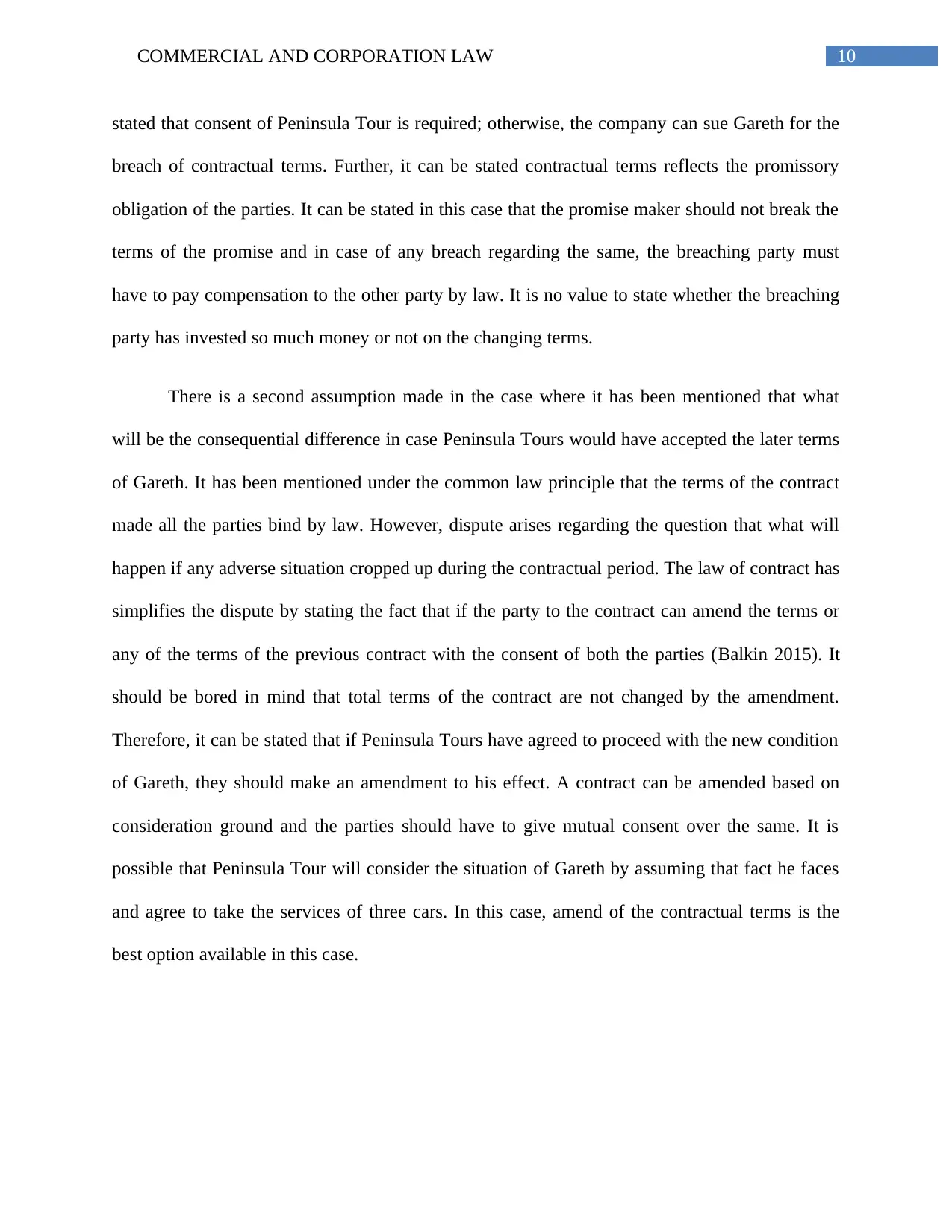
10COMMERCIAL AND CORPORATION LAW
stated that consent of Peninsula Tour is required; otherwise, the company can sue Gareth for the
breach of contractual terms. Further, it can be stated contractual terms reflects the promissory
obligation of the parties. It can be stated in this case that the promise maker should not break the
terms of the promise and in case of any breach regarding the same, the breaching party must
have to pay compensation to the other party by law. It is no value to state whether the breaching
party has invested so much money or not on the changing terms.
There is a second assumption made in the case where it has been mentioned that what
will be the consequential difference in case Peninsula Tours would have accepted the later terms
of Gareth. It has been mentioned under the common law principle that the terms of the contract
made all the parties bind by law. However, dispute arises regarding the question that what will
happen if any adverse situation cropped up during the contractual period. The law of contract has
simplifies the dispute by stating the fact that if the party to the contract can amend the terms or
any of the terms of the previous contract with the consent of both the parties (Balkin 2015). It
should be bored in mind that total terms of the contract are not changed by the amendment.
Therefore, it can be stated that if Peninsula Tours have agreed to proceed with the new condition
of Gareth, they should make an amendment to his effect. A contract can be amended based on
consideration ground and the parties should have to give mutual consent over the same. It is
possible that Peninsula Tour will consider the situation of Gareth by assuming that fact he faces
and agree to take the services of three cars. In this case, amend of the contractual terms is the
best option available in this case.
stated that consent of Peninsula Tour is required; otherwise, the company can sue Gareth for the
breach of contractual terms. Further, it can be stated contractual terms reflects the promissory
obligation of the parties. It can be stated in this case that the promise maker should not break the
terms of the promise and in case of any breach regarding the same, the breaching party must
have to pay compensation to the other party by law. It is no value to state whether the breaching
party has invested so much money or not on the changing terms.
There is a second assumption made in the case where it has been mentioned that what
will be the consequential difference in case Peninsula Tours would have accepted the later terms
of Gareth. It has been mentioned under the common law principle that the terms of the contract
made all the parties bind by law. However, dispute arises regarding the question that what will
happen if any adverse situation cropped up during the contractual period. The law of contract has
simplifies the dispute by stating the fact that if the party to the contract can amend the terms or
any of the terms of the previous contract with the consent of both the parties (Balkin 2015). It
should be bored in mind that total terms of the contract are not changed by the amendment.
Therefore, it can be stated that if Peninsula Tours have agreed to proceed with the new condition
of Gareth, they should make an amendment to his effect. A contract can be amended based on
consideration ground and the parties should have to give mutual consent over the same. It is
possible that Peninsula Tour will consider the situation of Gareth by assuming that fact he faces
and agree to take the services of three cars. In this case, amend of the contractual terms is the
best option available in this case.
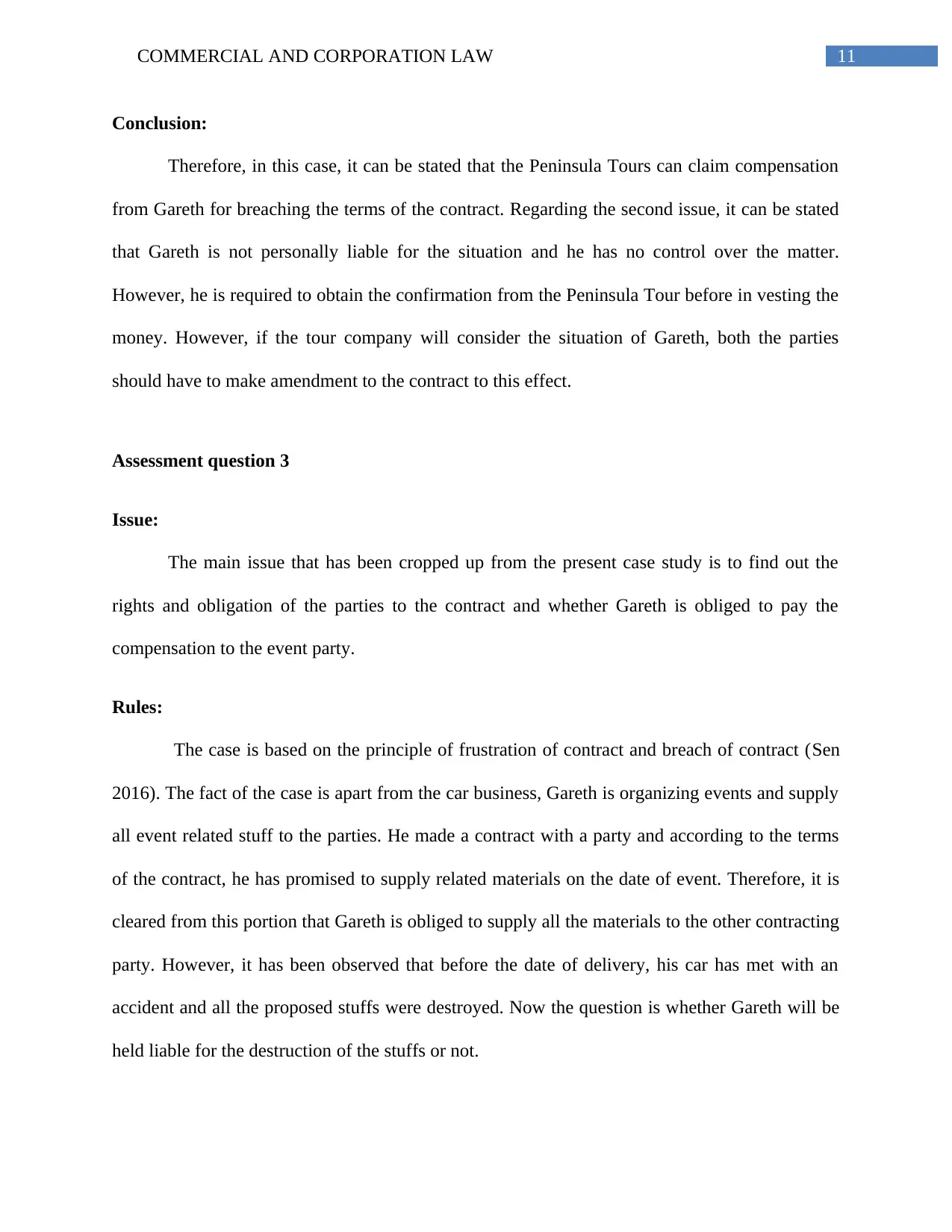
11COMMERCIAL AND CORPORATION LAW
Conclusion:
Therefore, in this case, it can be stated that the Peninsula Tours can claim compensation
from Gareth for breaching the terms of the contract. Regarding the second issue, it can be stated
that Gareth is not personally liable for the situation and he has no control over the matter.
However, he is required to obtain the confirmation from the Peninsula Tour before in vesting the
money. However, if the tour company will consider the situation of Gareth, both the parties
should have to make amendment to the contract to this effect.
Assessment question 3
Issue:
The main issue that has been cropped up from the present case study is to find out the
rights and obligation of the parties to the contract and whether Gareth is obliged to pay the
compensation to the event party.
Rules:
The case is based on the principle of frustration of contract and breach of contract (Sen
2016). The fact of the case is apart from the car business, Gareth is organizing events and supply
all event related stuff to the parties. He made a contract with a party and according to the terms
of the contract, he has promised to supply related materials on the date of event. Therefore, it is
cleared from this portion that Gareth is obliged to supply all the materials to the other contracting
party. However, it has been observed that before the date of delivery, his car has met with an
accident and all the proposed stuffs were destroyed. Now the question is whether Gareth will be
held liable for the destruction of the stuffs or not.
Conclusion:
Therefore, in this case, it can be stated that the Peninsula Tours can claim compensation
from Gareth for breaching the terms of the contract. Regarding the second issue, it can be stated
that Gareth is not personally liable for the situation and he has no control over the matter.
However, he is required to obtain the confirmation from the Peninsula Tour before in vesting the
money. However, if the tour company will consider the situation of Gareth, both the parties
should have to make amendment to the contract to this effect.
Assessment question 3
Issue:
The main issue that has been cropped up from the present case study is to find out the
rights and obligation of the parties to the contract and whether Gareth is obliged to pay the
compensation to the event party.
Rules:
The case is based on the principle of frustration of contract and breach of contract (Sen
2016). The fact of the case is apart from the car business, Gareth is organizing events and supply
all event related stuff to the parties. He made a contract with a party and according to the terms
of the contract, he has promised to supply related materials on the date of event. Therefore, it is
cleared from this portion that Gareth is obliged to supply all the materials to the other contracting
party. However, it has been observed that before the date of delivery, his car has met with an
accident and all the proposed stuffs were destroyed. Now the question is whether Gareth will be
held liable for the destruction of the stuffs or not.
⊘ This is a preview!⊘
Do you want full access?
Subscribe today to unlock all pages.

Trusted by 1+ million students worldwide
1 out of 19
Related Documents
Your All-in-One AI-Powered Toolkit for Academic Success.
+13062052269
info@desklib.com
Available 24*7 on WhatsApp / Email
![[object Object]](/_next/static/media/star-bottom.7253800d.svg)
Unlock your academic potential
Copyright © 2020–2026 A2Z Services. All Rights Reserved. Developed and managed by ZUCOL.




